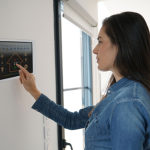Vacations are a time to relax and recharge, but they end up being more exhausting than restful all too often. The culprit? Electronics. While staying connected while away from home is tempting, there are plenty of ways to enjoy your vacation without spending all your time plugged in.
Add a few energy-efficiency tips to your vacation checklist while preparing your home for your time away to offer you peace of mind and save money on your electricity bills.
It all starts at home if you want to have a stress-free trip. Here are four things to ask yourself to help you save money, avoid wasting electricity, and secure your equipment while you’re away.
1. Have you Unplugged any Electronics or Appliances that Aren’t in Use?
Before you unplug, double-check that your electronics are also unplugged. It’s critical to track down any equipment utilizing phantom power. These devices aren’t in use yet; nevertheless drain energy, even when they’re in standby mode.
Turn off the lights in any given room and search for blazing lights from devices to detect phantom power in your home. It might include your satellite television box, video game system, or speaker dock. You could buy an intelligent PowerBar to handle the job instead of disconnecting all phantom power generating items. When the primary device is turned off, these affordable devices automatically switch off the electricity to equipment attached to secondary outlets.
Pre-trip awareness of these types of electronics can assist prevent power spikes that can occur while you’re away, ensuring that you don’t return to unwelcome surprises.
2. Have you Taken Precautions to Secure your Home for your Peace of Mind?
If safety is a concern, there are several fantastic energy-efficient methods to keep your home looking “lived-in” that don’t necessitate keeping the lights on all day. Consider bright lighting, which includes features and controls such as scheduling different lights to turn on around the house to simulate better that someone is at home. The ability to control these devices remotely from your phone is huge.
However, because these gadgets rely on WiFi, it’s critical not to switch off the router before leaving. Analog outlet timers, which employ a counter to turn lights on and off at specific times, are also available.
Consider your home’s outside as well. For added security, install motion-activated sensors or an outdoor floodlight. LED-based motion sensor lights are also an excellent, energy-saving choice.
3. Have you Activated the Vacation Mode on your Water Heater?
It’s a good idea to put your water heater on vacation mode if you’re gone for an extended period. This setting lowers the appliance’s energy usage and guarantees that it isn’t constantly heating the water while no one is home. This setting is convenient if you’re going away during the winter months because it prevents freezing pipes.
4. Is your Thermostat set to “Away” Mode?
It’s crucial to consider the temperature inside your home when away from home, whether you’re avoiding the heat or the cold. If you have a smart thermostat, you can set it to ‘away’ or ‘eco’ mode to keep your home in a low-energy setting.
If your smart thermostat has sensors, they can detect whether you’re at home or not and change the temperature accordingly. It can also overrule your pre-existing schedule to save you even more money, which comes in handy when you forget to set up your smart thermostat before leaving.
You may turn off the ‘away’ or ‘green’ mode and adjust your thermostat to the right temperature for when you return from your smartphone or computer.
Here are some other suggestions for conserving electricity when on vacation.
The Use of Air Conditioning
You may be afraid that leaving the air conditioner on while on vacation will not help you save energy, but you’re not sure if you should turn it off. If you’re only going away for a weekend, turning it off is sensible to save money on cooling energy.
If you’ll be gone for a week or more, it’s best to leave the air conditioner running but raise it to around 85 degrees. Each temperature change can reduce the air conditioner’s energy consumption by two to three percent, saving you money. You’ll also avoid an excessive accumulation of heat and humidity, which can damage electronics, computers, furniture, and structural components like drywall, wood flooring, and trim, by keeping the temperature at 85 degrees.
If you don’t already have one, now is the time to get one to use the built-in vacation mode to keep your house at a steady temperature while you’re gone. You can configure your typical temperature setting for the day you return, ensuring that the house is relaxed and comfortable when you get home.
Electronics and Appliances
Many appliances and electronics waste energy even when they aren’t in use. TVs, laptops, cable boxes, game stations, the coffee pot, microwaves, and smaller devices such as digital clocks, mobile phone chargers, and electric razors fall into this category. You can avoid this never-ending energy loss by unplugging all of these devices before leaving town. Pulling the plugs can save energy while also protecting your devices from power surges and reducing the risk of electrical fires.
If you’ll be gone for a week or longer, set the refrigerator and freezer temperature knobs to 42 degrees and 5 degrees to save even more electricity. These temperatures are cool enough to keep your food safe while also saving you money on your electricity cost.
Lighting
While leaving a few lights on while on vacation to deter burglars is a good idea, you may save energy and give would-be burglars the impression that the house is occupied by putting selected lights on timers. Because they produce less heat, replacing aging incandescent bulbs with energy-saving compact fluorescent lamps (Cf Ls) or light-emitting diode (LED) bulbs can save even more energy and reduce the cooling burden on the air conditioner.
Window Treatments
Although your window coverings aren’t energy consumers, you can use them to reduce the energy consumption of your air conditioner while you’re away. Close all the blinds and shades just before you leave on vacation to keep the sun out and limit heat buildup, putting more pressure on the A/C. You can use this method to conserve even more electricity throughout the cooling season.
Does Switching Things off at the wall Save Electricity?

Most people believe that switching things off at the wall saves electricity, but this is not always the case. Depending on the type of device, leaving it plugged in could use more power than turning it off at the switch.
For example, devices with a standby mode, such as televisions and computers, use a small amount of power even when turned off. It is because they’re designed to be turned on quickly, so they’re always ready to go. While the amount of power they use in standby mode is small, it can add up if you have multiple devices.
Another example is devices that have digital displays, such as clocks and microwaves. These devices use power to keep the display lit, even when turned off. If you have a lot of devices with digital displays, it can also add up.
So, does this mean you should never turn things off at the switch? Not necessarily. While it might not save electricity in all cases, it’s still a good habit to get into. It’s always best to check with the manufacturer to see what they recommend.
Conclusion
Going on vacation is a time-honoured tradition, but it can also be expensive if you want to save money while away from home, consider unplugging your appliances. Even if you only do this for the days you’re gone, you could see significant savings on your energy bill. And remember, while you’re unplugging your appliances, don’t forget to turn off the lights!
Another way to save money while on vacation is to take advantage of free activities. Many cities and towns offer free concerts, festivals, and other events. Check the calendar of events for your destination before you leave so you can plan accordingly. And don’t forget, the best way to save money is to plan. By doing a little research and planning ahead of time, you can have a great vacation without breaking the bank.
Breaking the bank on vacation doesn’t have to mean preceding your dream destination or itinerary. There are many ways to save money while still enjoying your time away from home. So go ahead and start planning your dream vacation—be sure to keep an eye on your budget!







Leave a Reply